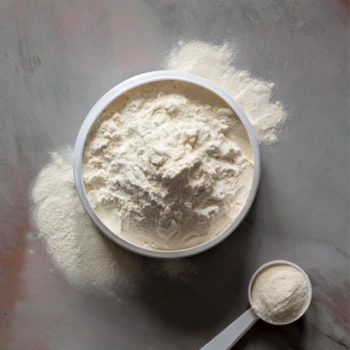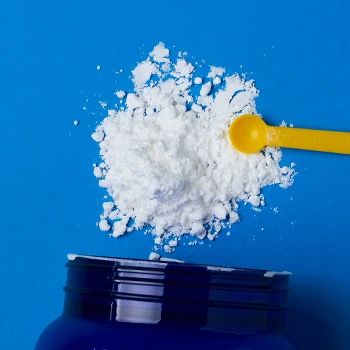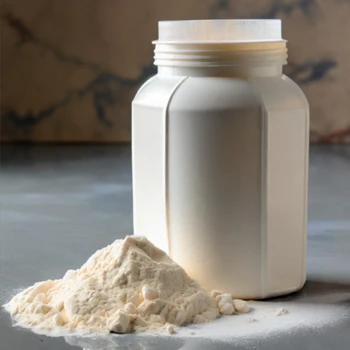Dedicated gym-goers and bodybuilders thrive on pre-workout during hard workouts.
Many users want that same kickstart for real-life on non-workout days, so one of the questions I get from my patients is, can pre-workout supplements be taken every day?
This wildly depends on the particular product, so I took a couple of weeks investigating common ingredients and their side effects to help you determine if daily pre-workout consumption is safe and sustainable.
This is what I found.
Quick Summary
- Utilizing pre-workout supplements daily is fine for healthy adults looking to enhance their energy, athletic performance, or focus.
- Long-term use of pre-workouts can lead to side effects such as dependency, jitteriness, and insomnia, particularly due to high caffeine content.
- The FDA considers a daily intake of 400 mg of caffeine safe for most adults, which is relevant as many pre-workout supplements contain caffeine ranging from 150 mg to 300 mg per serving.
- Personally, I've found that taking breaks from pre-workout supplements and focusing on a nutritious diet helps maintain my patient's fitness without dependency.
Is It Bad to Take Pre Workout Everyday?

You can use a pre-workout daily if you're healthy and seeking enhanced energy, performance, or focus.
When Is It Okay to Take Pre-workout Every Day?
From experience of my patients, taking a pre-workout every day has been okay since it primarily boosts their mental performance both in and out of the gym, helping them stay sharp and focused.
If, after you assess your diet and exercise routine, as well as your overall health, you determine you still want to consume a daily dose of pre-workout, I would encourage you to check out these organic pre-workout supplements.
Pre-workouts often contain nootropics for cognitive enhancement, offering a mental boost even on non-workout days.
When Is It Not Okay to Take Pre-workout?

It is not okay to take pre-workout if you have underlying health conditions, are becoming dependent, have jitteriness or insomnia, or the pre-workout constraints have sub-par ingredients.
Possible Side Effects of Taking Pre-workout on Long Term
Dependency
From experience of my patients, I found that consuming pre-workout supplements gave them the energy kick and focus needed for a more intense workout. But, there was a phase where they felt the “need” to consume it daily, signaling that it was time to take a break.
Jitters and Crash
I've noticed that the high caffeine content in some pre-workouts caused them jitteriness, and they had often crash post-workout. They had to reduce the dosage to mitigate these effects.
Loaded With Sugar or Artificial Additives
I advise avoiding pre-workouts with artificial additives or high sugar. For daily use, opt for supplements with clean, natural ingredients.
Insomnia
One of my patient once had the habit of taking pre-workouts later in the day, but it started disrupting his sleep due to the caffeine content. He had to monitor his sleep quality closely and adjust his pre-workout timing to ensure better rest at night.

Common Pre-workout Ingredients

Pre-workout supplements typically contain caffeine, creatine, amino acids, and sometimes B vitamins.
Knowing each ingredient's function helps users choose wisely. Caffeine boosts alertness, creatine offers rapid energy, amino acids support muscle recovery, and B vitamins are crucial for energy production.
Most pre-workouts are safe for healthy adults. Choose products with clear labels and third-party testing for reliability. Now, let's explore common pre-workout ingredients and their safety aspects.
Caffeine
Most pre-workouts contain caffeine because of its ability to enhance athletic performance, boost energy, and increase focus. It may be one of the most effective natural performance enhancers, according to a study published in PubMed Central [1].
The FDA considers 400 mg of caffeine daily a safe amount for most adults to consume [2].
The caffeine content in pre-workouts varies greatly, somewhere between 150 mg to 300 mg, or 1-3 cups of coffee. You should be mindful of this amount and caffeine’s half-life of about five hours if you have caffeine intake from other sources like coffee, tea, soda, or an energy drink.
If caffeine is not an ingredient you looking for, then look over our selection of the best pre-workouts without caffeine.
Beta-alanine

Beta-alanine is a non-essential amino acid made naturally in the body that aids in the production of carnosine. It is a popular pre-workout supplement ingredient because it may reduce acid build-up in your muscle tissue, allowing your muscles to work harder for longer [3].
I remember how one of my patient told me about the first time he experienced a tingling sensation while using a pre-workout supplement; He later learned beta-alanine was the culprit. Though it was unpleasant initially, it wasn't harmful, and he got used to it over time.
But not all supplements contain beta-alanine, and some people prefer that. Here is a list of some great pre-workouts without beta-alanine that we personally tried and tested.
Branched-chain Amino Acids (BCAAs)
According to PubMed, to promote muscle growth and reduce muscle soreness, many pre-workout manufacturers include branched-chain amino acids (BCAAs) in their formula [4].
Protein-rich foods like meat, poultry, fish, lentils, quinoa, nuts, and seeds, are good sources of BCAAs, and if you maintain a well-balanced diet, you are probably consuming enough.
However, supplementing BCAAs, like in a pre-workout supplement, is a generally safe way to reduce fatigue, increase muscle mass, and even enhance weight loss [5].
Creatine

Creatine is popular among athletes as a standalone supplement or as one of many performance-enhancing pre-workout ingredients.
Research explores creatine's potential for healthy aging and cognitive benefits. It fuels muscles for more intense, prolonged workouts, promoting muscle growth and strength [6].
There has been much debate around the safety of pre-workouts containing creatine, but there is a lack of evidence showing anything other than it is generally safe.
“Creatine has a strong safety profile. It’s been studied in a range of people in high doses for years without any health risks.”
- Gavin Van De Walle, MS, RD
Nitric Oxide Precursors
Nitric oxide in pre-workouts relaxes blood vessels and promotes blood flow, delivering much-needed nutrients and oxygen to hard-working muscles [7].
Products that include nitric oxide precursors like l-arginine, l-citrulline, and even beetroot juice are popular among many gym-goers for their vasodilating effects, allowing the user more muscle pumps at a higher intensity and duration.
Nitric oxide precursors are also considered safe at the proper dosing amounts. The beetroot juice in some supplements may cause urine to be a dark red color; this is not harmful.
Does Taking It Every Day Build Up Tolerance?

I realized that daily pre-workout use led to tolerance, diminishing its energy boost. This often happens with caffeine and other stimulants, especially when combined with other caffeine sources, but can also occur with different ingredients.
If you're experiencing tolerance, consider these options:
- Take a break from your current pre-workout for a few weeks, then resume.
- Try different supplements, like stimulant-free options, before returning to your usual one.
Many find the effects of pre-workouts lessen over time, necessitating a break or switch.
Remember, pre-workouts shouldn't become a crutch. A healthy exercise routine should be sustainable without constant supplement reliance. If you're dependent on pre-workouts for every workout, it might be time to reassess and allow your body to re-adjust to exercising without them.
FAQs
How Many Times a Week Should I Use Pre-workout?
You should use pre-workout 3-4 days per week for optimal results and less risk of building up a tolerance to caffeine. Even using pre-workout daily is ok, as most pre-workout supplements contain all-natural ingredients that are generally safe for most people.
Should I Take Pre-workout on Rest Days?
You should take pre-workout on rest days if you are looking for nootropics benefits. Most pre-workouts include cognitive enhancer ingredients, and many find a pre-workout supplement more enjoyable than coffee for these effects.
References:
- https://www.ncbi.nlm.nih.gov/pmc/articles/PMC6835847/
- https://www.hsph.harvard.edu/nutritionsource/caffeine/
- https://jissn.biomedcentral.com/articles/10.1186/s12970-015-0090-y
- https://pubmed.ncbi.nlm.nih.gov/28934166/
- https://www.healthline.com/nutrition/bcaa#Dosage-instructions
- https://www.healthline.com/nutrition/creatine-pros-and-cons#pros
- https://www.healthline.com/nutrition/nitric-oxide-supplements
About The Author
You May Also Like






